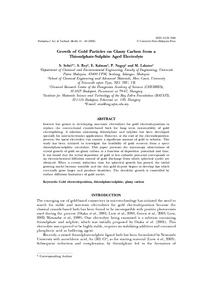Citation
Sobri, Shafreeza and Roy, S. and Kalman, E. and Nagyp, P. and Lakatos, M.
(2008)
Growth of gold particles on glassy carbon from a Thiosulphate-sulphite aged electrolyte.
Pertanika Journal of Science & Technology, 16 (1).
pp. 41-48.
ISSN 0128-7680; ESSN: 2231-8526
Abstract
Interest has grown in developing non-toxic electrolytes for gold electrodeposition to replace the conventional cyanide-based bath for long term sustainability of gold electroplating. A solution containing thiosulphate and sulphite has been developed specially for microelectronics applications. However, at the end of the electrodeposition process, the spent electrolyte can contain a significant amount of gold in solution. This study has been initiated to investigate the feasibility of gold recovery from a spent thiosulphate-sulphite electrolyte. This paper presents the microscopy observations of crystal growth of gold on glassy carbon as a function of deposition potentials and time. It was found that the initial deposition of gold at less cathodic potential corresponds to an electrochemical diffusion control of gold discharge from which spherical nuclei are obtained. When a certain induction time for spherical growth has passed, the initial growing nuclei become unstable and the thin gold deposit begins to develop tips which eventually grow larger and produce dendrites. The dendritic growth is controlled by surface diffusion limitations of gold nuclei.
Download File
![[img]](http://psasir.upm.edu.my/40538/1.hassmallThumbnailVersion/Growth%20of%20Gold%20Particles%20on%20Glassy%20Carbon%20from%20a%20Thiosulphate-Sulphite%20Aged%20Electrolyte.pdf)  Preview |
|
PDF
Growth of Gold Particles on Glassy Carbon from a Thiosulphate-Sulphite Aged Electrolyte.pdf
Download (31MB)
| Preview
|
|
Additional Metadata
Actions (login required)
 |
View Item |

